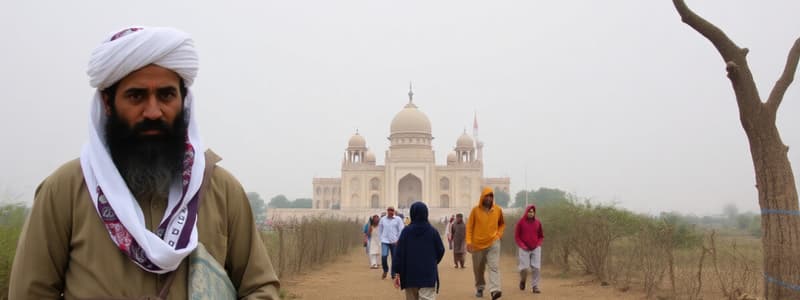Podcast
Questions and Answers
Given the sociopolitical climate described, what latent psychological impact might the mother's actions (praying, planning escape routes, sleeping with a knife) have on Malala's developing sense of security and agency?
Given the sociopolitical climate described, what latent psychological impact might the mother's actions (praying, planning escape routes, sleeping with a knife) have on Malala's developing sense of security and agency?
- It creates a paradoxical sense of heightened vigilance alongside a subliminal erosion of trust in institutional protection, instigating a complex negotiation between dependence and autonomy. (correct)
- It primarily serves to normalize the presence of violence, enabling her to view the conflict as an expected part of life and neutralizing the psychological impact of the threats.
- It fosters a sense of resilience and proactive problem-solving skills, equipping her with the tools to navigate future crises independently, thus enhancing her agency.
- It primarily reinforces a culturally normative acceptance of external threats, thereby minimizing the psychological disruption and promoting a fatalistic outlook on personal safety.
Considering the father's unwavering public stance against the Taliban amidst escalating threats, what potential game-theoretic models could elucidate the strategic rationality (or irrationality) underlying his behavior, taking into account factors such as reputational capital, risk assessment, and perceived probability of adverse outcomes?
Considering the father's unwavering public stance against the Taliban amidst escalating threats, what potential game-theoretic models could elucidate the strategic rationality (or irrationality) underlying his behavior, taking into account factors such as reputational capital, risk assessment, and perceived probability of adverse outcomes?
- A prisoner's dilemma model, illustrating a scenario where individual rationality (self-preservation) leads to a collectively suboptimal outcome (escalating violence), contrasting with a cooperative strategy of silence.
- A coordination game model, assuming that his actions are solely based on aligning with international expectations, where the optimal strategy is to conform to global norms of human rights advocacy regardless of local risks.
- A signaling game model, where the father is using costly signals (public defiance) to convey his resolve and strength to both the government and the Taliban, attempting to alter their beliefs and actions. (correct)
- A zero-sum game model, where the father's gains in public admiration directly correlate with the Taliban's loss of power, and thus, the escalating threats represent a rational response to maintain their position.
In the context of escalating school bombings and the family's discussions of escape plans, what epistemological frameworks can be employed to deconstruct Malala's childhood understanding of safety, fear, and resistance, especially regarding her reliance on the 'magic pencil' as a coping mechanism?
In the context of escalating school bombings and the family's discussions of escape plans, what epistemological frameworks can be employed to deconstruct Malala's childhood understanding of safety, fear, and resistance, especially regarding her reliance on the 'magic pencil' as a coping mechanism?
- A Marxist framework, whereby her magical thinking represents a false consciousness, obscuring the material realities of power imbalances and the exploitation perpetuated by the Taliban's actions.
- A structuralist framework, where Malala's magical thinking reflects the societal structures that perpetuate patriarchal narratives and limit her agency to navigate real-world threats.
- A phenomenological framework, emphasizing the subjective experience of threat and the lived reality of fear, where the 'magic pencil' serves as an existential anchor in a world defined by uncertainty and violence. (correct)
- A post-structuralist framework, revealing how her understanding of safety is discursively constructed through personal experiences and familial narratives, shaping her identity as a passive recipient of external forces.
Considering the mother's preparations for potential Taliban intrusion (knife under the pillow, escape plans), analyze the intersection of gendered roles and agency within the conflict, contrasting her private acts of resistance with the father's public defiance, while also assessing their differential impacts on the family's psychological well-being and Malala's perception of courage.
Considering the mother's preparations for potential Taliban intrusion (knife under the pillow, escape plans), analyze the intersection of gendered roles and agency within the conflict, contrasting her private acts of resistance with the father's public defiance, while also assessing their differential impacts on the family's psychological well-being and Malala's perception of courage.
Given the context of imminent threats and active violence, what cognitive biases might influence the parents' decision-making processes regarding risk assessment and protective measures, and how might these biases differentially affect their actions and perceptions of danger?
Given the context of imminent threats and active violence, what cognitive biases might influence the parents' decision-making processes regarding risk assessment and protective measures, and how might these biases differentially affect their actions and perceptions of danger?
Flashcards
Father's courage
Father's courage
The unwavering bravery shown by the narrator's father despite danger.
Mother's worry
Mother's worry
The concern and anxiety that the narrator's mother experienced for her family's safety.
School bombings
School bombings
Attacks on schools aiming to instill fear among students and families.
Activism against Taliban
Activism against Taliban
Signup and view all the flashcards
Emergency plans
Emergency plans
Signup and view all the flashcards
Study Notes
Character's Daily Life
- Father displays unwavering courage despite threats and warnings from concerned friends
- Father actively seeks help from the government regarding school bombings
- Father travels between Islamabad and Peshawar to plead with government officials
- Mother is worried about the safety of the family
- Character and other family members engage in planning for potential Taliban threats
- Character tries to find ways to protect themselves and family
- Character contemplates calling the police if needed
Studying That Suits You
Use AI to generate personalized quizzes and flashcards to suit your learning preferences.




